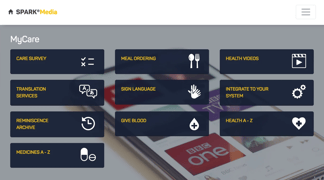4 Forms of Entertainment for Dementia Patients
6 minute read | 08/10/2021

Research has shown that there are a variety of stimulating activities for those with dementia, from gardening and cooking to museums and animal therapy. But what about tailored entertainment individuals can engage with digitally especially in a healthcare setting?
Entertainment plays an essential role in all resident experiences, but perhaps even more so for those with dementia as it can help stimulate, de-stress and encourage interaction during their stay. What’s more, there will be more and more dementia residents to cater for in the near future, according to recent research. Utilising the myriad of resources developed by dementia experts to aid in the day-to-day living with dementia, healthcare environments can provide more for their residents today whilst future-proofing and delivering for the future as well.
More Cases of Dementia, More Dementia Residents
Dementia is a syndrome that more than 55 million people live with worldwide. It causes deterioration of cognitive function, impacting the physical, psychological and social wellbeing of those diagnosed with it.
The number of people diagnosed with dementia is expected to rise as populations continue to live longer around the world and are made up of more elderly people — the key demographic for this condition.
As a result, it’s estimated that the number of dementia cases will reach 78 million in 2030 and 139 million in 2050, more than double the total count as it stands today.
With more people living with dementia comes more dementia patients and a greater need to provide bespoke services for those affected during their hospital stay or whilst in long-term care.
For people with dementia, life begins to appear differently, even though the syndrome doesn’t hinder consciousness. A dementia patient may experience memory loss, unusual thinking patterns, impact on orientation, comprehension and calculation as well as issues with language and judgement.
There’s no definitive cure to dementia, although new treatments are being tested and trialled all the time. However, we do know that optimising the physical health, cognition, activity and wellbeing of dementia patients helps improve the quality of life of dementia residents and control their symptoms as much as possible.
As such, entertainment for dementia residents should be designed with these goals in mind, either looking at ways to stimulate cognitive activity, encourage physical exercise, promote wellbeing or improve health.
4 Forms of Entertainment for Dementia Residents Ideal for Healthcare Settings
Entertainment for those living with dementia in a healthcare setting should encourage independent uptake, although it can also be enhanced by participating with friends and family.
Most healthcare entertainment is available via digital devices or through small objects such as books and board games. Depending on a resident’s condition and available funding, entertainment needs to be easy to access, even for those who are bed-bound.
Finally, entertainment for dementia residents should avoid pointing attention to what someone can’t do. Rather it should be stimulating but not triggering, engaging but not taxing, interactive but not overwhelming. The following four forms of entertainment meet these criteria:
1. Arts & Crafts
Arts-based activities such as drawing, painting, patient drama groups or even book clubs can help those with dementia to stay socially involved during hospital stays, especially when they’re a regular or long-term inpatient.
In addition to this, arts provided by caregivers, coined art therapy, is thought to help those with dementia increase brain stimulation, improve memory and boost physical strength. The overarching benefit is that it improves patient wellbeing through the expression of creativity and a sense of achievement.
In healthcare settings, care homes with enough funding can organise group activities to create opportunities for dementia residents to engage in activities as a part of a community. On a more individual basis, art supplies, books and even digital tablets can be provided for those with dementia to practise art in their room.
2. Games & Puzzles
Like art therapy, games and puzzles can provide a sense of achievement, helping individuals feel they have accomplished something amongst a sea of other activities that are now “done for them” by others. Puzzles can also have a therapeutic effect and provide periods of both independence and interactivity with others. As such, they have a range of holistic benefits for dementia residents.
From a scientific standpoint, puzzles can also provide some physical benefit as they offer a complete brain exercise. Completing things like jigsaws, crosswords and trivia games can help improve spatial reasoning, strengthen memory and improve problem-solving ability.
Puzzles help those living with dementia remain focused on a specific task, helping them remain calm, avoid low moods and confusion. They also provide a talking point for friends and visitors.With tablets and patient entertainment systems utilised across the NHS, dementia residents can access these games and puzzles to keep them calm and occupied.
3. Sensory Experiences
Although not always as straightforward to employ in a healthcare setting, sensory experiences that focus on the five senses — sight, sound, smell, taste and touch — benefit those with dementia. Activities such as massage, knitting and organising objects can help keep some of the negative emotions associated with dementia at bay, such as anxiety and anger.
These experiences focus on enjoyment rather than a result, putting slight pressure on the participant. They also present a little challenge, avoiding feelings of frustration or defeat.
In care home settings, purpose-built sensory experiences might be available, yet even something as basic as the provision of movies and TV can help to provide a sight and sound experience. Relatives giving a fresh bunch of flowers is also another example of a sensory experience.
4. Reminiscence Activities
While dementia can affect both long and short-term memory loss, early dementia and the onset of the syndrome are more commonly associated with memory loss surrounding recent events, while long-term memory remains intact. Because of this, many healthcare facilities angle activities around reminiscence and life work, a practice that emphasises the era a resident has grown up in and their individual life experiences.
Reminiscence activities are recommended by the NHS, as they advocate that “photos, objects, video and music clips, either as a book or on a tablet or other digital device” be used as a way of engaging dementia patients. For those living with dementia, this practice is incredibly beneficial, helping them spark conversation and regain independence as they can openly share and add to a discussion.
In hospitals, reminiscence work can be carried out between practitioner and patient, entirely independently by listening to music or flipping through photos or perhaps most effectively with friends and family who can equally contribute.
Another example is having a patient entertainment system that allows dementia residents to access film and music from their era, taking them to a time they enjoyed most.
At SPARK TSL, we’re passionate about helping care homes and healthcare providers to supply their residents and patients with as many entertainment options as possible, starting with digital devices. Dementia patients need forms of entertainment catered to them and their needs and our latest features can help your residential facility or Trust offer that.
This October, SPARK TSL will be attending The Care Show at Birmingham’s NEC Arena. From the 13th-14th of October we will be joining exhibitors from across the world of care provision to display a solution that can be tailored to you and your resident’s needs. Prioritising care for those living with dementia and stimulating their long-term memory as well as facilitating access to a range of digital services that make virtual care provision that little bit easier.
We’d love to see you there, follow this link to reserve your space and digitally transform your care provision.
Discover Constantly Evolving Patient Entertainment Like Never Before
Our patient engagement platform and entertainment package cater to all types of residents and patients. However, we continually update bespoke features such as Music Memories, a support link and a form of reminiscence activity for those with dementia.
To see the latest update and the newest features to entertain your patients, click on the link below.
About the author
Rebecca O'Donovan
Becky is the Marketing Director at SPARK TSL, of whom she has worked for since 2012. She is responsible for high-level marketing strategy focusing on lead generation and aiding the vision of the business to ensure business growth.
More articles by the author
Related articles
 Healthcare Industry
Healthcare Industry
Top 10 Patient Experience Games & Apps
Patient experience games do more than entertain and distract the hospital population. Levelling up the ...
 Patient Experience
Patient Experience
WiFi SPARK adds Dementia support links to SPARK® Media
SPARK® Media - the most comprehensive and inclusive patient entertainment system on the market, has recently ...
 The SPARK Solution
The SPARK Solution
Is the NHS patient engagement platform performing? January 22
Each month we take a look inside the NHS’ favourite patient engagement platform, SPARK® Media to see how ...


